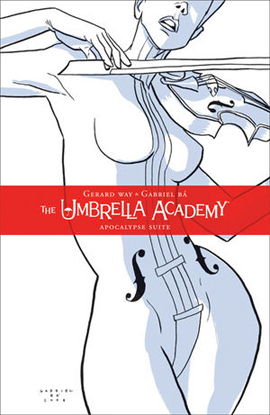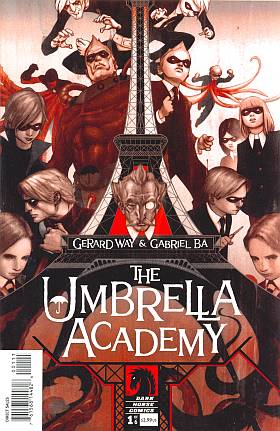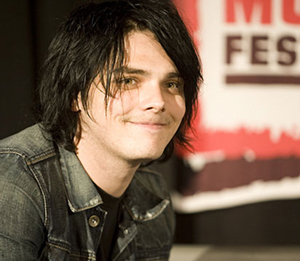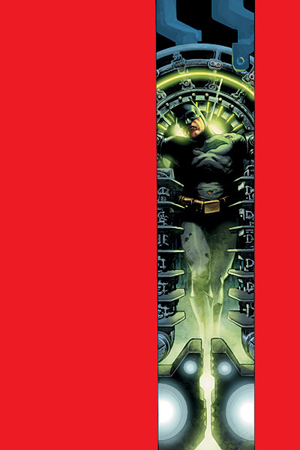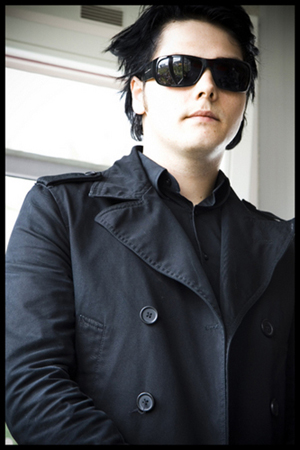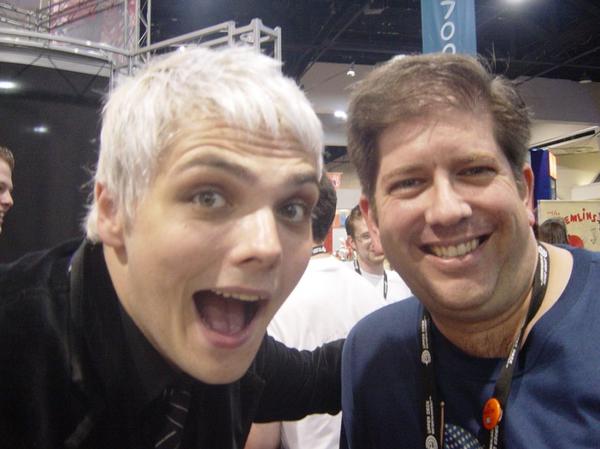
Can I say that it just seems bizarre that one man can capture the hearts of teen-age girls everywhere, and then start sucking in the guys in their 30s and 40s? But Gerard Way has accomplished just that as a musician and creator/writer of the Dark Horse comics series [amazon text=The Umbrella Academy].
You know what really stinks about it? He’s an incredibly nice and humble guy, too. So when a new contributor to Fanboy Planet, Deborah Jill Draisin contacted me because she thought she might be able to get some time with Gerard, I had to jump at it. Thank you, Deborah, for offering, thank you Dark Horse for agreeing, and thank you Gerard for answering even the weird questions I made Deborah ask.
You know what else? This guy knows his stuff.
Deborah Jill Draisin: Good Afternoon, Gerard, this is Deb on behalf of Fanboy Planet. How are you?
Gerard Way: Ah cool! I’m great, Deb, how are you?
Deborah Jill Draisin: It’s a pleasure to meet you. Series One has just been completed and been made into a great book with special features; that’s exciting!
Gerard Way: Yeah it is. I got an advance copy of it.
Deborah Jill Draisin: Did you?
Gerard Way: Yeah it’s currently my favorite thing. It’s beautiful, and it’s cool because of the format that we picked for it – we spent a lot of time discussing the format. And it’s cool as a writer because it just makes me wanna create more so that way there’s just like a whole mess of them because it’s a very distinct format.
Deborah Jill Draisin: Suite #2’s cover features the following quote by Grant Morrison: “An ultraviolet psychedelic sherbet bomb of wit and ideas. The superheroes of the 21st Century are here at last.” How does it feel, having your hero compliment your work in that way?
Gerard Way: Um, that was, you know, reading that quote from Grant, and then obviously like he did the forward – which is also very sweet for the trade – it was a huge deal to me because… The best part about hearing Grant say that is I had read…basically it was almost like a Manifesto or something that he had written and found this bit of press (I believe it was from an interview) and he’d talked about this new wave of low-fi weirdness. He had wrote this way back in…it might have even been in the days of New X-Men or The Invisibles. It might’ve even back that long ago. Deborah Jill Draisin: Really?
Gerard Way: Yeah and I read this and I – you know to myself – I had really wanted to be a part of that wave and I didn’t feel like anybody really was epic to it, and I thought Grant was totally in this class of his own.
Deborah Jill Draisin: Absolutely!
Gerard Way: And he still is. And I think most writers at the time and even today are plugged into something completely different. I think these guys are…you know they’re just kind of writing whatever superhero drama currently needs to be written and that’s kinda what they’re doing, but there’s nobody that’s like really…I mean now obviously you have Matt Fraction and people like that – which you know Matt Fraction’s amazing – but you didn’t have this post-modern thing at the time so for Grant to really write that…it just made me feel so amazing.
Deborah Jill Draisin: Here’s a question for you: most artists are withdrawn – myself included. Was there a particular sort of life-defining incident I guess when you were young – you know, not just standard peer pressure – that contributed to that outlook?
Gerard Way: That’s a great question. Nobody’s ever asked me that. I think it was simply…I don’t know if it’s your environment that makes you withdrawn or the fact that you have the ability to live in your head and you would prefer it that way? I think that’s more of what it is. I realized that I had as a child an affinity to create things and make things up that weren’t lies, either; it wasn’t about lies, they were fiction – they were stories and characters and places – I was basically just dreaming. When I realized that I kind of dreamed out loud like that, that’s what made me withdrawn – because I preferred living in my own head.
Deborah Jill Draisin: I relate to that; yes I do.
Gerard Way: Yeah, that’s really the way it was.
Deborah Jill Draisin: In the lettercol – the AKA Lettercol – in Suite #4 (which actually the letters dated back to Suite #2; they were a little behind) Scott Allie had warned a hopeful fan not to expect an ongoing series, yet you’ve now said that you expect to do eight or more. This turned into a bit of a runaway train, didn’t it?
Gerard Way: It did, and well, the thing is: I think the reason that he said an “ongoing” is because we’d never intended this to be a monthly book. The thing about it – and it’s cool that I get to talk about it in an interview – is it’s a little limiting not doing an ongoing book as much as it’s liberating, because you only write a story when you have one. There’s lots of things that you can’t do; there’s lots of let’s say quiet moments – you’ve only got six issues in a clip; you can’t do a lot of those.
There are issues where I’d simply want The Umbrella Academy like going to get breakfast somewhere, and it’s hard to do that stuff because you‘ve got six issues; you gotta make ‘em count. With an ongoing book you can do that; you can riff on that stuff. I started to slowly realize; Umbrella Academy is the book where you kinda can’t do that, because it’s not a monthly. I definitely always intended there to be all these little… in a way they’re just vignettes of these characters’ lives there’s about eight or nine of them total.
Deborah Jill Draisin: That’s good that you mention that, because this one’s been bugging me: are we ever going to find out what happened to The Horror?
Gerard Way: Yeah, you are, and I don’t necessarily know that that’s something that’s going to happen sooner rather than later. I wish I could tell you why – there’s something that had to do with the Jennifer Incident that is a major point to The Umbrella Academy. A lot of people really like that character, even though they’ve only seen him briefly as an adult and very briefly as a child…there’s not even really any flashbacks of him.
Deborah Jill Draisin: No, there aren’t!
Gerard Way: There aren’t, yeah, and I don’t see there being one for quite a while either.
Deborah Jill Draisin: Okay, we’re gonna have to keep waiting then. The Umbrella Academy has been nominated for some very prestigious awards this year: you’re up for an Eisner as Best Limited Series, an Eagle for both Favorite New Comic and Favorite Cover (for Suite #1.) That’s quite an honor for a fledgling author such as yourself! How do you feel?
Gerard Way: I mean…that feels amazing! To put it in perspective: like, My Chemical Romance has never been nominated for a Grammy, but this year I was nominated as an Art Director for a Grammy (for the layout for “The Black Parade,” and all my involvement with that). You know, getting nominated for an Eisner, to me, is the one that feels better.
Deborah Jill Draisin: Of course!
Gerard Way: To me, that’s the one that counts. Like, a Grammy is cool, and I would love for the band to eventually have one of those – for the band – but getting nominated for an Eisner: that was the big one to me. As a kid trying to write comics, you always want…I mean, you have a dream of being nominated for an Eisner and to get it on the first series…!
Deborah Jill Draisin: It’s incredible!
Gerard Way: It’s so huge!
Deborah Jill Draisin: Sure, of course it’s huge! It’s the most incredible feeling…I guess for me as a writer myself it’d probably be like a Nobel Prize. Gerard Way: Right! Yeah, so it’s cooler than a Grammy.
Deborah Jill Draisin: Your artistic style, as far as your drawing and your painting – your artistic style in that direction – has become kind of refined over the years. You started favoring angular features; there’s a certain type of red that you always like to intertwine with your black and whites. Can you explain a little bit about the reason you view your world in this way?
Gerard Way: Wow, that’s a really good question. I don’t really know; I think…well there’s a part of me that always really wanted to be Alex Toth, you know (and he’s kind of an impossible dream for a lot of comic creators to chase). I think the guy I’ve seen get closest to it is obviously Steve Rude, and that’s because he’s a complete master.
If I could draw like Toth, I think…yeah it would be a dream come true (but I mean, I try all the time!) I think it got refined into that because I really started to look at his simplicity and kind of what he left out and things like that. I don’t know where the angles started to come from; it’s mainly been from Pat O’Neill and reading Marshall Law, that ended up being a big influence on the style. I’ve just always been a fan of a very rich kind of red and black and white – like those three colors to me always kind of screamed comic books.
I’m trying to think though: I don’t know why I view… I think I would probably rather be drawing different than I do.
Deborah Jill Draisin: How so?
Gerard Way: I mean, I’m kind of working with what I’ve got right now.
Deborah Jill Draisin: Well, what would you like to be doing differently?
Gerard Way: I wish I was a little bit more fluid, like somebody like Toth or an animator, even guys like Don Bluth. I love that kind of style, but that really comes from a tremendous amount of life study, and that’s how guys like that are able to bend it so well. I think the angles, if I had to pick, I think they come from being a real big fan of Greek statues and Greek Art, and I’m a huge fan of “The Myth” too, and I think that’s where it stems from.
Deborah Jill Draisin: Oh I see it, now that you mention it! Oh, that’s interesting. You’ve frequently referred to the cover of the Uncanny X-Men “Fever Dream” with Wolverine being crucified on a rudimentary wooden X as being both a favorite of yours as well as an attempt to irritate your Catholic parents a little bit (Gerard chuckles.) There’s a book “My Name Is Asher Lev” by Chaim Potok which tells the story of a Hasidic Jewish painter whose first showing features a painting of his mother on a cross, and he actually gets excommunicated for the atrocity. That story to me kind of furthers the strength of that image. What other images strike you as unforgettably daunting in that manner?
Gerard Way: “The Lovers” by Magritte has been the one painting that I saw while I was at Art School that really stood out to me, and like again with where I get my angular things from: I love “Guernica;” I think that painting is one of the most unbelievable things to me ever. I mean there’s not a whole lot really as far as the ones that really kind of stood out to me, like album covers more than anything. I’m trying to think of the ones that really…I mean probably most of the Pink Floyd albums.
Deborah Jill Draisin: I was just going to say “The Wall!”
Gerard Way: Yeah,” The Wall” and the biggest one I think is like “Animals.” The album cover for “Animals” is just like unreal; it’s probably one of my favorite images ever. So their album artwork’s really stuck out for me over the years.
Deborah Jill Draisin: Yeah it’s very disturbing – it definitely makes the point. You were recently interviewed by “Emily the Strange.” I’m gonna have to say you know you’ve arrived as a comic book author when you get to conduct an interview within a comic book as a character! Was that a blast to do?
Gerard Way: That was actually very fun, and I tried to make it as natural as possible when I was typing out my answers so it could appear that I was speaking to this character. That was a real blast, and to see the artwork come back…I’d never really read an Emily and I thought what was cool about it was the way that the page layouts were and everything’s just kind of intertwined; it was just really clever. It was like reading something out of a Mad Magazine, and I just loved how all the questions and answers and visuals flowed into each other, so I was really happy with that.
Deborah Jill Draisin: Yeah that was a fun read! Um, I promised Derek McCaw, he’s the Editor-In-Chief over there at fanboyplanet.com that I would ask you these; I’m assuming they’re going to make more sense to you than they do to me. He wants to know, since you worked as an intern at DC Comics, do you fear that you will be written out of the continuity in the Final Crisis?
Gerard Way: Oh my God, you know what’s funny about this question? I don’t know anything about Final Crisis at all! I have no idea…I don’t even know what the Original Crisis is! I have no idea, but hopefully Grant will find a way to work me out of the Final Crisis somehow.
Deborah Jill Draisin: Yeah, he’s gonna have to give you a hook-up there. You’re a pretty big gamer, right, Gerard? What’s the darkest secret that you can tell (Fanboy Planet) about your time as an elf?
Gerard Way: Oh well, you know the thing is…it’s totally not a dark secret; I just recently even started collecting modules. There’s something about old Dungeons and Dragons that it’s just like…it’s not even just nostalgic, it’s so enchanting to me! The fact that you can get together with a group of your friends at like ten years old and do that kind of thing and really make up these worlds and stories; I still reminisce about playing Dungeons and Dragons, and I still crack open these old books and look at all the mechanic imagery that got it in trouble back in the eighties.
Deborah Jill Draisin: (laughing) It gets all complex, doesn’t it?
Gerard Way: Yeah it’s so great; like I mean I played well into my twenties.
Deborah Jill Draisin: (laughing) You heard it here first, right?
Gerard Way: Yeah (chuckling a little) yeah.
Deborah Jill Draisin: I just have to ask, because um Number Five is by far my personal favorite character…
Gerard Way: Thank you!
Deborah Jill Draisin: You’re welcome! What happened in that diner? How did he do that? Are you gonna tell us?
Gerard Way: Cool! Yeah, I’m glad you asked. Series Two is going to deal with Number Five – it’s definitely Number Five’s kind of moment to shine. He kinda just came back into the fold, but it’s heavily centered around Number Five and the problem that his decision has caused, so there’s like an effect happening to things that he’s done. He is…actually he’s become quickly my favorite character.
Deborah Jill Draisin: Really?
Gerard Way: Yeah, and I think that’s why I decided to center the series around him – he’s just the best. I mean, like he’s just so like nihilistic and cynical, and he’s a really old man who’s been through so much stuff, and you never really even truly know how much he’s been through and what he’s done (and he’s done some awful things.) Basically, I found that my very, very cynical and fatalistic views…The Boy (we call him The Boy but Number Five) really ended up being my mouthpiece. I think a lot of people thought it was Séance.
Deborah Jill Draisin: I think they did too, or possibly Spaceboy.
Gerard Way: Yeah, I think a lot of people kind of assume because Séance is kinda gothic that he’s my mouthpiece, but it’s definitely started to turn more into Number Five. He’s just very much a character that I can talk through, a lot more so than any other character.
Deborah Jill Draisin: Yeah, and you know Number Five is kind of a weird deal, too, you know, because his best friend is Pogo, right, but he keeps hooking up with different Pogos.
Gerard Way: Right, right, right, yeah, totally.
Deborah Jill Draisin: So what’s gonna happen, there’s a couple of love interests going on, is that gonna get developed?
Gerard Way: Um well in Series Two you’ll kinda see that it’s relatively impossible right now for either of those love interests to go anywhere, and that’s mainly because of like a physicality issue. You’ll see in Series Two that it’s not even because of the action going on around them, it’s more because of the physical state of the characters right now, and so that kind of stuff will really be on hold. The thing with Rumour and Space is I intended for it to pan out like a very much like a realistic relationship with all this very realistic disappointment and hang-ups, so I never really intended that extreme focus.
There’s a DHP story that’s going up on MySpace where you get a glimpse of Kraken and Vanya at 17, and that definitely explains a little bit of their relationship, so that makes more sense for sure now.
Deborah Jill Draisin: Oh that’ll be interesting, because he’s definitely got problems that stem from that time period I’m sure.
Gerard Way: Yeah, they both do, and you kind of see why, and you see where the grudge that kind of pokes its head out in Issue Three, where that comes from. It makes a lot of sense to the readers.
Deborah Jill Draisin: Well, we’re expecting Series Two at the end of the year, correct?
Gerard Way: Yeah, in November.
Deborah Jill Draisin: Oh we’ll be looking forward to that. Gerard, thank you for your time, that was really enjoyable.
Gerard Way: Thank you!
Deborah Jill Draisin: We’re definitely going to be looking forward to seeing the collector’s editions; I’m sure they’re going to be a fun read, and there’s some extras in there aren’t there?
Gerard Way: Yeah, in the trade there’s a sketchbook section, and in the collector’s edition there’s an expanded sketchbook section and I’m gonna end up writing a bit for that. We’re talking about doing some more Umbrellicas because we actually, literally, ran out of time during the first series because it was such a seat-of-our-pants type deal.
Deborah Jill Draisin: Sure!
Gerard Way: We’d run out of time; there was supposed to be an Umbrellica every two, but it just didn’t work out that way, so we’re thinking of filling up the extra Umbrellicas in that.
Deborah Jill Draisin: That would tie up some loose ends!
Gerard Way: Sure, and that’s the cool thing about this story is you know there’s all kinds of different ways you can fill people in on backstory. What I love about Umbrella Academy is you’re in the middle of things, you’re never in the past, as far as you’re never seeing the story from the beginning so there’s all kinds of fun ways with which to say “Oh I’m gonna tell them about the time this happened when…”
Deborah Jill Draisin: It keeps it interesting!
Gerard Way: Yeah, it does.
Deborah Jill Draisin: Well, I personally can’t imagine anything funnier than the Eiffel Tower going berserk, so I gotta see what you come up with next,
Gerard Way: Right, right, right.
Deborah Jill Draisin: That was a good one. This is just a personal thing with me, but are you a fan of Spawn?
Gerard Way: Of Spawn?
Deborah Jill Draisin: Yeah.
Gerard Way: Um, you know not really, like I read it when…I was a fan of Todd’s art like from Spiderman and so I was reading the Spiderman before he got his own Spiderman then he got his and I read his Spiderman. I got the first few issues of Spawn but it didn’t really go anywhere for me personally – you know it was just a personal taste thing – I really do like his art though, he was like one of my guys growing up; I loved him and I loved Jim Lee.
Deborah Jill Draisin: Oh of course – um I actually just kind of asked that because I thought that the series had a bit of a darker outlook then the ones that were out at the time; you know Spidey got darker later, Batman got darker later, Spawn started out that way, he was bitter, people took his family from him…I just saw a correlation, you know these kids have no family and they’re bitter and they have issues going on among trying to save the world…it’s just something that struck me.
Gerard Way: Right, um, there’s really no connection with Spawn.
Deborah Jill Draisin: Oh no, I don’t think there’s a connection, I just think it was an interesting approach that you have and I was just drawing a correlation for me.
Gerard Way: Right, I know what you’re saying, yeah, you know I really wanted to show the characters after the adventures. I didn’t think the most exciting part was at their adventures and when they’re at their prime, I thought it was more interesting to show these characters after their prime.
Deborah Jill Draisin: I actually agree with you, because it forces the reader to try to figure out how they got that way.
Gerard Way: Exactly, and there’s all different kinds of ways with which I can show them that are way more interesting than just kind of like “Alright the story starts when they’re born” and let’s now follow them; like that would be so boring, and I didn’t really even want to do an orphan story at first.
Deborah Jill Draisin: Yeah especially for Vanya, because she’s pretty much stuck in that house for twenty years, right?
Gerard Way: Yeah, yeah, and actually, the cool thing about the DHP coming out; you get to see where she went for some time.
Deborah Jill Draisin: She went off to school; yeah I’d like to see what happened in that school.
Gerard Way: Yeah you see how she ends up going there.
Deborah Jill Draisin: Gerard, thank you so much for your time, it’s really appreciated. Everybody should check out Dark Horse Comics.

